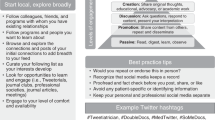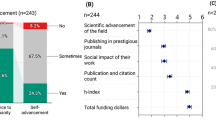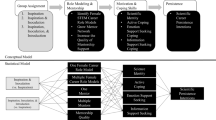Abstract
Cancer research relies on key values such as creativity, collaboration, research integrity and resource sharing. A positive research environment which fosters these key values is becoming a decisive factor for some funders and research institutions. To create a supportive research culture in laboratories, the training and mentoring of young scientists is important. However, the fast-paced and fierce competition for funding and jobs can present a challenge to the younger generation of scientists who depend on the guidance and mentorship of scientific leaders. The annual Nature Awards for Mentoring in Science have been created to bring attention to one of the most essential but least recognized skills in scientific leadership. Thus far, 35 scientists from across the world, who are working in a range of disciplines, have been recognized by this award for their outstanding scientific mentorship. In this Viewpoint, we have asked three recipients of this award who work in fields associated with cancer research about their views on good mentoring, and how a revised approach to mentorship can help to achieve a positive research culture and contribute to scientific discovery.
The contributors
Martin Clynes was founding Director of the National Institute for Cellular Biotechnology at Dublin City University, Dublin, Ireland, and he has an interest in several applications of cell culture. His cancer-related interests, working closely with clinical experts, include research on mechanisms of chemotherapy resistance and investigation of potential therapeutic targets and biomarkers in pancreatic, lung and breast cancer and in cutaneous melanoma. His research has contributed to a number of clinical trials.
Anita Corbett received her undergraduate degree in chemistry from Colgate University and her PhD degree in biochemistry from Vanderbilt University. She was a postdoctoral fellow at Dana Farber Cancer Institute/Harvard Medical School before joining the Department of Biochemistry at Emory University School of Medicine in 1997. In 2016, she moved to the Department of Biology at Emory University, where she is a tenured professor of biology and Co-Director of the Emory MD/PhD Program.
Julie Overbaugh, PhD, is the Endowed Chair for Graduate Education and Associate Director for Cancer Research Career Enhancement at Fred Hutchinson Cancer Research Center. Her research focuses on HIV transmission and the study of HIV immunity, including how it evolves and its impact on infection risk and pathogenesis. This research has been a long-standing collaboration with the Kenya Research Program. She has served in numerous leadership roles for grant review groups and major meetings in her field.
This is a preview of subscription content, access via your institution
Access options
Access Nature and 54 other Nature Portfolio journals
Get Nature+, our best-value online-access subscription
$29.99 / 30 days
cancel any time
Subscribe to this journal
Receive 12 print issues and online access
$209.00 per year
only $17.42 per issue
Buy this article
- Purchase on Springer Link
- Instant access to full article PDF
Prices may be subject to local taxes which are calculated during checkout
Similar content being viewed by others
References
Overbaugh, J. et al. A healthy work–life balance can enhance research. Nature 477, 27–28 (2011).
Beckett, S. Worstward Ho (Grove Press, New York, 1983).
Valantine, H. A. & Collins, F. S. National Institutes of Health addresses the science of diversity. Proc. Natl Acad. Sci. USA 112, 12240–12242 (2015).
Campbell, L. G. et al. Gender-heterogeneous working groups produce higher quality science. PLOS ONE 8, e79147 (2013).
McGee, R., Saran, S. & Krulwich, T. A. Diversity in the biomedical research workforce: developing talent. Mt. Sinai J. Med. 79, 397–411 (2012).
Schultheiss, K. Ghost advising. The Chronicle of Higher Education https://www.chronicle.com/article/Ghost-Advising/242729 (2018).
Vale, R. D. Keep your eyes on the prize. Cell 177, 506–509 (2019).
Wanda Hackett Enterprises. Effective communication styles inventory scoring form A. WHE http://whecare.com/images/form.pdf (1998).
Acknowledgements
The authors acknowledge the many mentees who have helped them embrace mentoring as an important skill throughout the years. A.C. also appreciates the insights of C. Freeman as they share ongoing conversations about mentoring.
Author information
Authors and Affiliations
Corresponding authors
Ethics declarations
Competing interests
The authors declare no competing interests.
Additional information
Publisher’s note
Springer Nature remains neutral with regard to jurisdictional claims in published maps and institutional affiliations.
Rights and permissions
About this article
Cite this article
Clynes, M., Corbett, A. & Overbaugh, J. Why we need good mentoring. Nat Rev Cancer 19, 489–493 (2019). https://doi.org/10.1038/s41568-019-0173-1
Accepted:
Published:
Issue Date:
DOI: https://doi.org/10.1038/s41568-019-0173-1
This article is cited by
-
Changing mindsets
Nature Reviews Cancer (2019)



